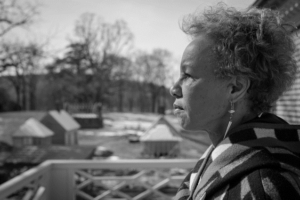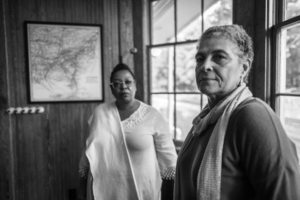MONTPELIER DESCENDANTS COMMITTEE
FOR IMMEDIATE RELEASE
Contact: Greg Werkheiser, Attorney at Law
Cultural Heritage Partners, PLLC
General Counsel to the Montpelier Descendants Committee
Phone: (703) 408-2002
Email: greg@culturalheritagepartners.com
Montpelier Sparks National Backlash with Board Vote to Abandon Promise to Share Governance with Descendants of the Enslaved
Thousands Sign Petition Condemning Action
Montpelier’s Social Media Accounts Swamped with Negative Reactions
Montpelier Staff Rebuke Employer for Broken Promise and Threatening Them
National Trust Warns of “Irreparable Harm” to Montpelier’s Legacy
Major Donors to Suspend Contributions
ORANGE, VA – March 28, 2022 – The Montpelier Foundation CEO and board are embroiled in a national backlash to the board’s vote on Friday to retract their much-publicized and praised promise to share governance of President James Madison’s estate with the organization representing descendants of the families whom Madison enslaved. The Montpelier Descendants Committee (MDC), the majority of Montpelier’s full-time staff, and the National Trust for Historic Preservation have strongly condemned the Foundation’s actions. Already, nearly 5,000 members of the visiting public and donors have signed a petition opposing the board’s actions and others have swamped Montpelier’s Twitter, Instagram, and Facebook pages with thousands of negative comments.
The Foundation board is entrusted to steward the 2,650-acre presidential plantation; it leases the site from the National Trust for Historic Preservation. In June of 2021, the board voted to change the bylaws to allow MDC to nominate “at least half” of Montpelier’s board members, a commitment referred to as structural parity. Under prior leadership, Montpelier was widely celebrating for leading the charge in engaging the descendant community. that was widely praised at the time. The Foundation previously recognized MDC, which has more than 300 members, as the “sole representative voice of the descendant community” because it is democratically organized and open to all who claim affiliation with the hundreds of people enslaved by the Madisons and their neighbors in the Virginia Piedmont. On Friday, the board voted to break their promise to MDC, insisting instead that they, the majority-white board, would choose descendant representatives because working with MDC was “difficult.”
MDC founding Chairman James French, who sits on Foundation board, observed that: “[j]ust a few years ago Montpelier was a pioneer in descendant engagement, but new leadership has treated descendants terribly. We’ve been used as a prop in a public performance to gain attention and money, while behind the scenes descendants and staff with whom we work well have been subject to racial animus and massive resistance.”
Over the past twenty years, Montpelier staff developed a productive working relationship with the descendant community. The staff now allege that CEO Roy Young has repeatedly threatened to terminate those who communicate with and support MDC. Despite these threats, the majority of the estate’s full-time staff members issued a public statement rebuking their employer for breaking its commitment to MDC and demanding a change to the toxic work environment.
Nine months after the board pledged to share governance, only three MDC-nominated board members have been appointed to the board of sixteen members. In addition, the board refuses to review a list of forty highly qualified board prospects, including persons of national prominence in the fields of philanthropy, history, government, and businesses, identified by MDC.
In advance of the vote, the National Trust warned the Foundation board Chairman Gene Hickock “in the strongest possible terms” against doing further harm to Montpelier. The letter states: “Most critically, this commitment [to parity with MDC] acknowledged the right of the descendant community to define itself, rather than to be defined by the Foundation [emphasis in original]. The newly proposed revisions to the bylaws would do the opposite. We believe this change would undermine decades of important work that led to the formation of the Committee in the first place, and in turn would set back Montpelier’s efforts to continue the necessary work of uplifting descendants’ voices, and repairing the relationship between the broader African American community and Montpelier, the former site of generations of enslavement.”
Dr. Matt Reeves, Director of Archaeology at Montpelier, directly articulated the situation: “The board’s resistance to full parity with the MDC rests in the threat they see in expanding the national narrative beyond the myth of the Founding Fathers to include all people in this history. The battle being carried out at Montpelier between the board and the MDC and staff is sadly a modern version of the struggle between those with power and those without that we find in evidence in the archaeology at Montpelier.”
Before this regression, Montpelier had a substantial history as a model for descendant community engagement, starting in the 1990s when Rebecca Gilmore Coleman advocated for the preservation and restoration of buildings on the estate associated with enslaved people. More recently, Montpelier staff and descendants convened a summit of 57 scholars and practitioners who developed a set of best practices for historic institutions that engage with the history of enslavement. The Rubric of Best Practices Established by the National Summit on Teaching Slavery encouraged the equitable inclusion of descendants within the board governance structure as the most ethical and exemplary model for relationship-building at such institutions.
MDC and the staff allege that Hickok and Young have sought to maintain the positive attention from their structural parity commitment while gutting its substance and attempting to sever longtime collaborations and friendships between MDC members and Montpelier staff. They also allege that Hickok and Young have removed MDC members from board nomination decisions, excluded them from board meetings, and rerouted conversations with MDC representatives through lawyers. The further allege that the Foundation appointed persons to the board whom they touted as advancing parity but whom had publicly expressed opposition to MDC. Foundation lawyers have pressured MDC to sign side agreements limiting what MDC can say and do as a partner in governance.
“That’s pretend power-sharing,” said MDC’s lawyer, Greg Werkheiser of Cultural Heritage Partners, PLLC. Werkheiser proposed a compromise in February that would allow the Foundation to reject MDC board nominees for ethical and legal reasons, but not because Black descendants did not fit the profile of the current board. Werkheiser stated that “the whole point of including descendant voices is to broaden the perspective of leadership, not to reinforce a historically narrow approach to telling history.” Hickock declined to review MDC’s list or to share it with the full board.
Since the arrival of Hickock and Young, Montpelier employees allege they are suffering an increasingly hostile work environment. Dr. Elizabeth Chew, Vice President and Chief Curator at Montpelier, noted that “[a]fter more than twenty years of partnership with descendants, Montpelier staff members have since 2020 been threatened with termination for contacting colleagues and friends in the descendants’ community. Montpelier leadership has lied to staff about progress toward sharing governance with MDC. All the while, important research and interpretation projects for which we have funding in hand and that depend on the relationship with MDC remain on hold.”
Within 24 hours of the board’s vote on Friday, nearly 5,000 people had signed a petition supporting the MDC and Montpelier staff. When on Sunday the Foundation issued a public statement blaming their decision on the “difficulty” of working with MDC, thousands flooded the Foundation’s social media accounts overwhelmingly negative comments. Major donors to Montpelier have written to the board expressing their intention to cease contributions.
The Foundation sent a hurried press release on Sunday afternoon attempting to explain its vote by claiming that it was “broadening” the pool from which it would choose board members. One social media commentor wrote: “Chery picking board members in an effort to silence anyone who disagrees with your whitewashed views is not working toward structural parity.”
MDC board member Dr. Iris Ford, associate professor emerita of anthropology at St. Mary’s College of Maryland, remarked: “Our fight is about so much more than a historic plantation in rural Virginia. Over 200 years after the ratification of the Constitution, African Americans are still fighting for the protection and liberties that it claims to guarantee. What we are doing at Montpelier is fighting for the very soul of our nation.”
Dr. Bettye Kearse, MD, one of the few MDC members on the Foundation board and author of The Other Madisons: The Lost History of a President’s Black Family, stated: “MDC remains committed to the rich and important history told at Montpelier, to the beauty and power of the Montpelier estate and grounds, and to the longevity and strength of the Foundation. MDC members have spent decades of their lives researching Montpelier’s history and archaeology and developing innovative and award-winning historical interpretation projects. Montpelier is not the board, but the board must be receptive to substantive change for Montpelier to survive and thrive.”
French concluded: “We will not be deterred from our mission to contribute to uniting the country by telling a more complete and truthful history of our founding, including the full role of its indispensable ‘invisible founders.’”
# # #
About the Montpelier Descendants Committee
The Montpelier Descendants Committee (MDC) is a 501(c)3 nonprofit devoted to restoring the narratives of enslaved Americans at plantation sites in Central Virginia, including but not limited to James Madison’s Montpelier, from the margins to the center of historical discourse. The MDC promotes a more accurate understanding of the lives of enslaved people based on broader, richer and more truthful interpretations of American history. Through a series of public programs, events, research, and communications the MDC seeks to demonstrate how the lives of enslaved persons made possible and informed the ideals of universal liberty enshrined in the Declaration of Independence and the Constitution, yet denied to them. Membership in the MDC is open to all descendants of enslaved ancestors in the central Virginia area, known as the Arc of Enslaved Communities.
Photos
Descendant Bettye Kearse, MD, PhD (top); Descendant first cousins Iris Ford, PhD and Madlynn Anglin (bottom). Photos by Eduardo Montes-Bradley.

